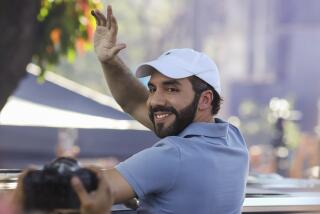Cuban Party Takes Few Steps to Reform System : Communism: Profits for individual artisans are OKd, but farmers must continue to sell to the state.
- Share via
MEXICO CITY — Cuba’s Communist Party, its rule threatened by shrinking Soviet aid, ended a five-day congress Monday with limited steps toward an economic and political opening of President Fidel Castro’s rigid one-party system.
The 1,600 party delegates approved a partial privatization of the island’s service sector to allow one-person shops of mechanics, carpenters and other tradespeople to work for personal gain. But they ruled out a similar concession that would let individual farmers sell crops directly to consumers without price controls.
Delegates also called for direct popular voting for Cuba’s National Assembly, with non-Communists eligible to seek election. They retained a ban on opposition parties but ended one against religious believers joining their own ranks.
The reforms had been anticipated long before Cuba’s survival prospects were darkened by the collapse in August of Soviet communism. Specialists on Cuban affairs called the measures timid for the challenge at hand.
Castro told the congress, meeting in Santiago, that upheaval in the Soviet Union, the Cuban revolution’s historic benefactor, “has affected us in a terrible way,” delaying a wide range of foodstuffs and other Soviet goods to the import-dependent island.
Delegates responded by ratifying Castro’s current course--a centrally planned effort to boost hard-currency exports, draw foreign investment to Cuba’s tourist industry, mobilize volunteer labor to boost farm output and crack down on black-market activity.
“We are going to defend ourselves alone, surrounded by an ocean of capitalism,” Castro, 65, told delegates. “We have a historic responsibility to carry forward the ideals of socialism.”
Cuba watchers said they doubted that the strategy adopted could slow the island’s economic collapse.
“The critical issue for Cuba is food supply,” said Wayne S. Smith, a former chief of the U.S. Interests Section in Havana. “If the Cuban leadership can keep people fed, then they have time to make changes in the rest of the system. But I don’t see how they can do that without introducing more private initiative than they seem willing to do.”
Andrew Zimbalist, an economics professor at Smith College, said he had expected “a more radical and imaginative” response to the curtailment of Soviet aid and trade. “You’d think that if they’re behaving rationally, (the Cubans) would make bigger changes, but the Soviet factor cuts two ways,” he said. “They see themselves under siege in the world. They don’t have anywhere to turn, and that makes them tighten up, become more repressive and controlling.”
Some Castro advisers had called for a return to the “peasant market” experiment of the early 1980s, when farmers could sell to private buyers instead of to the state. The markets boosted food production but were abolished in 1986 on grounds that middlemen had reaped undue profits.
Rising from his seat, Castro declared that a repeat of the experiment would “sow corruption and demoralization.” He asked: “How are we going to share food around, with money, with free markets? It is in times of crisis when there are even fewer free things.”
Castro, who seized power in 1959, dominated the closed proceedings. In selective votes aired on Cuban television and monitored here, delegates often waited to see whether their leader’s hand went up before raising their own.
The party congress was the fourth since Cuba formally embraced socialism in 1976. Delegates represented 600,000 party members in a country of 10.7 million. They re-elected Castro as the party’s first secretary and his brother Raul as second secretary. Then they chose a younger 225-member Central Committee, which in turn named a new 25-member Politburo.
Among the aging members dropped from the old Politburo were Vice President Jose Ramon Fernandez, who led the Cuban army against the 1961 U.S.-sponsored Bay of Pigs invasion; Culture Minister Armando Hart, and Raul Castro’s wife, Vilma Espin. The 12 new members include Carlos Aldana, the party’s ideology chief, and Gen. Leopoldo Cintras Frias, who led Cuban troops in Angola.
The leadership shake-up and call for direct National Assembly elections were aimed at making the one-party system more responsive. But Castro slammed the door on Western-style democracy, calling it “complete garbage.” Twelve Cuban dissidents who joined last week in a public appeal for a multi-party system were arrested in Havana as the congress opened.
The law-making National Assembly has been elected by provincial assemblies, which in turn have been elected by municipal assemblies--the only government bodies now chosen by popular vote. Under the reforms adopted, provincial assemblies now will also be elected by voters.
“This will give the Cuban people some ray of hope that they can get their complaints more promptly attended to,” said Gillian Gunn, a Cuba specialist at the Carnegie Endowment for International Peace. “As it is now, if you don’t have water in your building, there is no equivalent of a congressman you can turn to and say, ‘Fix this or I’m not going to vote for you.’ ”
More to Read
Sign up for Essential California
The most important California stories and recommendations in your inbox every morning.
You may occasionally receive promotional content from the Los Angeles Times.













